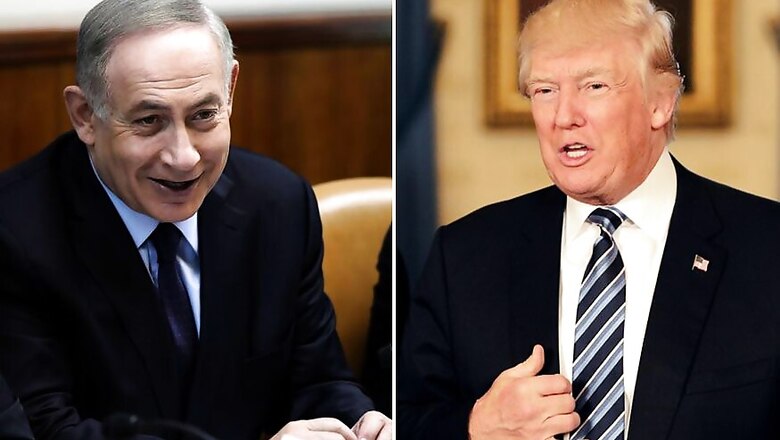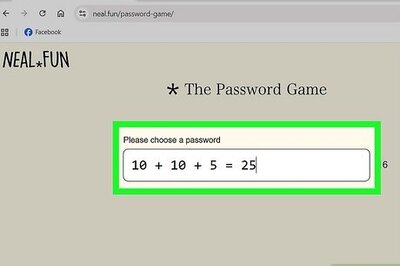
views
Jerusalem: US President Donald Trump on Sunday discussed Iran with Benjamin Netanyahu and invited the Israeli prime minister to visit the White House early next month.
The two leaders spoke by telephone and "agreed to continue to closely consult on a range of regional issues, including addressing the threats posed by Iran," the White House said in a statement, signalling the new administration's tougher line on Tehran.
The statement also said that Trump invited Netanyahu "to an early February meeting at the White House."
Israel approved hundreds of new settler homes in east Jerusalem Sunday hours before the telephone call, which an Israeli statement described as "very warm".
But a potentially explosive plan to annex a large West Bank Jewish settlement unilaterally was shelved until after Netanyahu and Trump meet.
"The prime minister expressed his desire to work closely with President Trump," Netanyahu's office said in a statement.
Trump has pledged strong support for Israel and vowed during his campaign to recognise Jerusalem as the country's capital despite the city's contested status.
But the White House statement concerning the call did not mention Trump's suggestion to move the US embassy from Tel Aviv to Jerusalem -- a transfer that would break with the consensus of the vast majority of the international community, which does not recognise Jerusalem as Israel's capital.
The White House on Sunday appeared to play down suggestions that a decision was imminent.
"We are at the very beginning stages of even discussing this subject," White House press secretary Sean Spicer told AFP.
Like other major powers, the US maintains its embassy in Tel Aviv pending a resolution to the Israeli-Palestinian conflict and Jerusalem's status.
Israel captured Arab east Jerusalem during the 1967 war and later annexed it -- in a move not recognised by the international community -- declaring all of the city its unified capital.
The Palestinians claim east Jerusalem as the capital of their future state.
During the phone call on Sunday, Trump also stressed the need for direct talks between Palestinians and Israelis.
"The president emphasised that peace between Israel and the Palestinians can only be negotiated directly between the two parties, and that the United States will work closely with Israel to make progress towards that goal," the White House said.
The US is Israel's most important ally, providing more than $3 billion a year in defence aid, but former president Barack Obama grew frustrated with Israeli settlement building.
He declined to veto a December 23 UN Security Council resolution condemning settlements. Trump had called for the resolution to be vetoed.
- 'We can finally build' -
In an initial move following Trump's inauguration, Israeli officials on Sunday approved building permits for 566 settler homes in annexed east Jerusalem.
"The rules of the game have changed with Donald Trump's arrival as president," Jerusalem Deputy Mayor Meir Turjeman told AFP.
"We no longer have our hands tied as in the time of Barack Obama. Now we can finally build."
The Palestinian presidency condemned the move, calling it a violation of the UN resolution.
A draft bill to annex the Maale Adumim settlement in the occupied West Bank had been on the agenda for approval by a ministerial committee legislation on Sunday.
Such a move could badly damage prospects for a two-state solution.
But the inner circle of senior ministers known as the security cabinet blocked it for the time being, a member said.
"What was decided was to wait for the meeting which will certainly take place within a few weeks," Energy Minister Yuval Steinitz told Israeli public radio.
Annexing Maale Adumim unilaterally would set off alarm bells globally, with many warning that it would be another step towards dividing the occupied West Bank between north and south, making a contiguous Palestinian state difficult to achieve.
- 'Critical location' -
For some Israeli ministers who oppose a Palestinian state, that is precisely the point.
"We have to tell the American administration what we want and not wait for orders from the administration," Justice Minister Ayelet Shaked told Israel's army radio.
Maale Adumim, in a strategic location east of Jerusalem, has some 37,000 residents.
Some peace proposals have envisioned it becoming part of Israel in land swaps agreed with the Palestinians, but not unilaterally.
Israel occupied the West Bank, like east Jerusalem, in 1967.
Settlements in both the West Bank and east Jerusalem are viewed as illegal under international law.
Some 400,000 Israeli settlers live in the West Bank, with another 200,000 in east Jerusalem. In comparison, around 2.9 million Palestinians live in the West Bank and east Jerusalem.


















Comments
0 comment